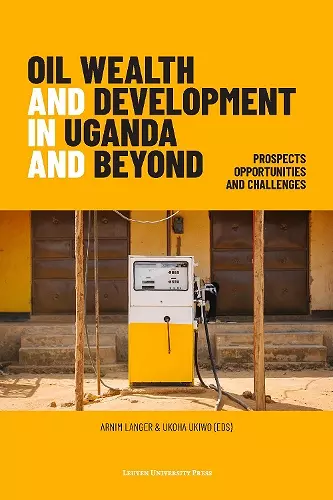Oil Wealth and Development in Uganda and Beyond
Prospects, Opportunities and Challenges
Arnim Langer editor Ukoha Ukiwo editor
Format:Paperback
Publisher:Leuven University Press
Published:7th Jan '20
Currently unavailable, and unfortunately no date known when it will be back

Large quantities of oil were discovered in the Albertine Rift Valley in Western Uganda in 2006. The sound management of these oil resources and revenues is undoubtedly one of the key public policy challenges for Uganda as it is for other African countries with large oil and/or gas endowments. With oil expected to start flowing in 2021, the current book analyzes how this East African country is preparing for the challenge of effectively, efficiently, and transparently managing its oil sector and resources. Adopting a multidisciplinary, comprehensive, and comparative approach, the book identifies a broad scope of issues that need to be addressed in order for Uganda to realize the full potential of its oil wealth for national economic transformation. Predominantly grounded in local scholarship and including chapters drawing on the experiences of Nigeria, Ghana, and Kenya, the book blazes a trail on governance of African oil in an era of emerging producers. Oil Wealth and Development in Uganda and Beyond will be of great interest to social scientists and economic and social policy makers in oil producing countries. It is suitable for course adoption across such disciplines as International/Global Affairs, Political Economy, Geography, Environmental Studies, Economics, Energy Studies, Development, Politics, Peace, Security and African Studies. Ebook available in Open Access. This publication is GPRC-labeled (Guaranteed Peer-Reviewed Content). Contributors: Badru Bukenya (Makerere University), Moses Isabirye (Busitema University), Wilson Bahati Kazi (Uganda Revenue Authority), Corti Paul Lakuma (Economic Policy Research Centre), Joseph Mawejje (Economic Policy Research Centre), Pamela Mbabazi (Uganda National Planning Authority), Martin Muhangi (independent researcher), Roberts Muriisa (Mbarara University of Science and Technology), Chris Byaruhanga Musiime (independent researcher), Germano Mwabu (University of Nairobi), Jackson A. Mwakali (Makerere University), Tom Owang (Mbarara University of Science and Technology), Joseph Oloka-Onyango (Makerere University), Peter Quartey (University of Ghana), Peter Wandera (Transparency International Uganda), Kathleen Brophy (Transparency International Uganda), Jaqueline Nakaiza (independent researcher), Babra Beyeza (independent researcher), Jackson Byaruhanga (Bank of Uganda), Emmanuel Abbey (University of Ghana).
Seventeen papers analyze how Uganda is planning to deal with the challenge of effectively, efficiently, and transparently managing its oil sector and resources, examining the institutional, legal, fiscal,environmental, social, macroeconomic, political, and financial dimensions of the Ugandan oil governance regime. Papers discuss the “resource curse” of economic, social, and political challenges experienced by countries rich in oil, gas, and other minerals; the role and functioning of the main formal institutions established to manage, oversee, and regulate Uganda’s oil exploration, development, and revenue management; Uganda’s legal-regulatory oil regime and its leeway for abuse and misappropriation; the opportunities for revenue mismanagement in Uganda’s standard oil revenue chain; the dynamics of deal making between the Government of Uganda and international oil companies, as well as the strategies employed by the government to remain in charge of the oil sector; Uganda’s macroeconomic management regime and the fiscal rules the Government of Uganda has put in place to achieve a balance between spending and saving; the opportunities that the oil revenues offer with regard to social development; the certainty and stability of Uganda’s oil fiscal regime; human resource challenges and opportunities facing Uganda’s emerging oil sector; the main environmental issues linked to oil development and the adequacy of the existing environmental regulatory systems in regulating potential problems associated with the upstream oil and gas activities in Uganda; the processes of land grabbing as a result of oil exploration and exploitation in Uganda; the expectations of Ugandans concerning their country’s oil and gas resources and the extent to which the government and the oil companies have managed these expectations appropriately; the emergent social tensions and conflicts linked to the advent of oil exploration and exploitation in Uganda; challenges and policies linked to Nigeria’s oil governance regime; challenges and policies linked to Ghana’s oil governance regime; challenges and policies linked to Kenya’s oil governance regime; and the effectiveness and soundness of Uganda’s oil governance regime.
2021. "Annotated Listing of New Books." Journal of Economic Literature, 59 (1): 297-371. DOI: 10.1257/jel.59.1.297
ISBN: 9789462702004
Dimensions: 234mm x 156mm x 20mm
Weight: 600g
394 pages